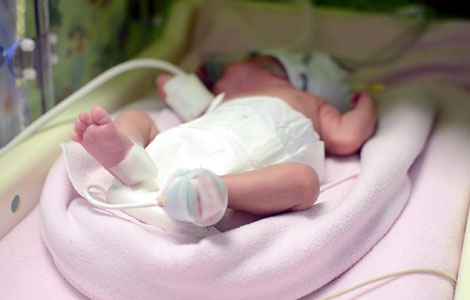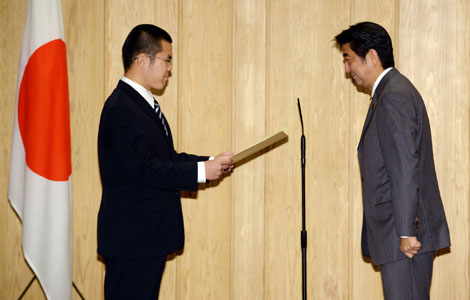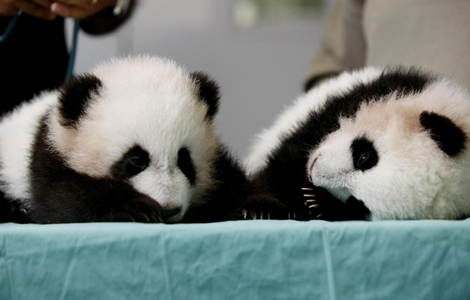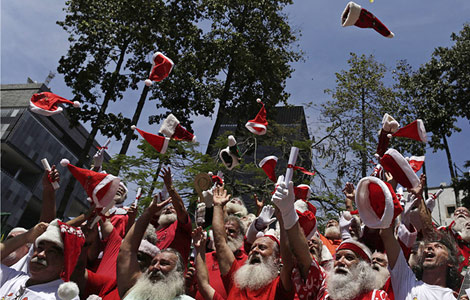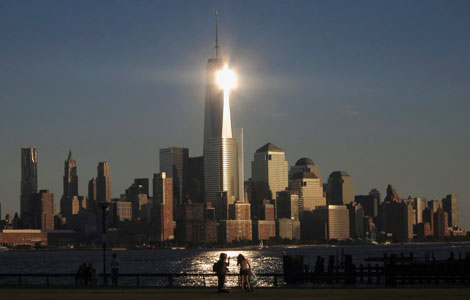

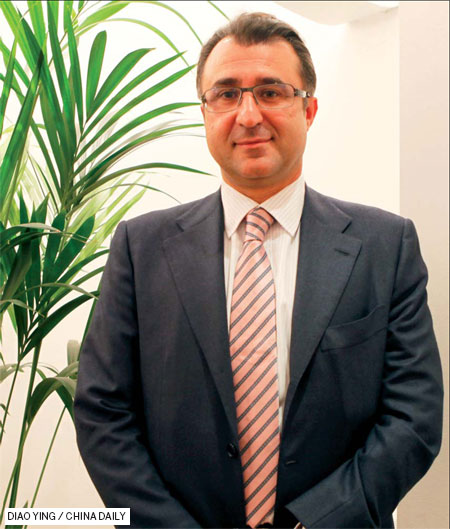
A visit to China nine years ago opened a new world for an Italian businessman and his company
The first time Dardanio Manuli went to China, many of his friends and colleagues thought he was mad. It was the autumn of 2003, soon after the pandemic SARS killed more than 900 people worldwide, a third of them on the Chinese mainland.
Not only did the Milan businessman return home alive and well, but it turned out to be a trip that would have a marked impact on his life. It gave him a starting point to explore markets outside Europe, putting his business on a firmer footing that has helped it weather the current European recession.
Manuli, 47, is the chairman and chief executive officer of Manuli Rubber Industries, a family business that makes hydraulic products used in construction and mining.
His company's sales reached 320 million euros ($408 million) last year, higher than in 2008, before the financial crisis.
The trip changed his perception of the world, he says. Before it, his understanding of China was scant. What he did know was that it was far away, and he expected to find a backward country in which "everything would be difficult".
Once he arrived, he was struck by how modern and sophisticated the country was, including the airports, railways and highways, and he was even more impressed with the business people he met. Many were in their 20s, and they already had the authority to make executive decisions, he says.
"They were very, very well prepared. They had a good understanding of the macro economy, the industry, and a good command of English."
Even more surprising for him, he says, was that, in contrast to Europe, many of these business people were women.
In Italy, he says, someone in their 60s could still be regarded as young, and the fate of those in their 20s, 30s and even older is to line up for work opportunities and the chance to exercise power.
Shortly after the trip, in 2005, the company made its first financial investment in China, buying land in the eastern coastal city of Suzhou for a manufacturing plant.
Business has grown since then, and now the plant, which supplies Asian markets, employs 500 people. The company also has a research and development center there.
That was only seven years ago, but it feels like 70 years, Manuli says.
That experience reflects another great difference he sees between China and Europe: In China things change at lightning speed, but in Europe change is genteel, even snail-paced.
The company was founded by his grandfather, also called Dardanio Manuli, 78 years ago. In those days, Dardanio junior says, Italy bore many similarities to China today. People moved from poor regions, in Italy's case the south, to the better-off parts of the country, where they toiled away to make better lives for themselves.
For Dardanio Manuli senior that meant upping sticks and moving to the northern city of Milan, where he set up a company that made electrical insulating tape, power cables and rubber hoses. Since then, it has developed into a business with operations worldwide.
Manuli says what helped with growth over the years was that the former Italian currency, the lira, was undervalued, meaning products made in Italy were competitive outside the country compared with those of other European countries.
He says that the advantage, one that helped make Italy prosperous, evaporated when the country adopted the euro in 2002, and its economy has been in decline ever since.
Today's recession is the result of a lack of competitiveness and policy adjustments for many years, he says, and many family businesses in Italy have withered and died.
Manuli, who joined the company 20 years ago, attributes its survival and success to his family's hard work. While the business has generated wealth, it is the ideal of having correct priorities, passed down through the generations, that accounts for its success, he says.
"Bring food to the table first, then think of other things," he quotes his grandfather as saying.
On a trip to Britain recently, he visited a football museum in Manchester and took a photo of a quote by Sir Alex Ferguson, the manager of Manchester United: "Hard work will always overcome natural talent when natural talent does not work hard enough."
The company's annual report last year also looked to the world of sport for inspiration, highlighting a quote by Michael Jordan: "Teamwork wins games, but teamwork and intelligence wins championships."
Manuli says that Ferguson's quote encapsulates his belief that to succeed in business "there is no alternative to hard work".
He reckons that spirit is missing in Europe, and that young people, with inherited wealth, are not used to hard work. "People just sit and wait for somebody to help, but the world does not work that way."
When he sees "small emperors" in China, he wonders whether, when they grow up, they will be willing to sacrifice their own pleasure for economic improvement like their parents did.
The difficulty of being an entrepreneur, he says, is to decide where you invest your limited financial and human resources.
"There are no manuals to teach you that. Every time you choose this path, it means you are not choosing that one."
A lot of data can be available, but someone has to finally make a decision.
"Very often you are alone with your own instincts. The life of an entrepreneur is like sailing without a map, sniffing the air Nobody can tell you what the right thing is."
A surfeit of information applies to China, he says.
In the West, there are many China experts with divergent views, and he does not turn to them, he says, feeling that many have prejudices that they are only too willing to confirm. Instead, he reads Chinese media, taking in a multiplicity of views. He also travels, talks to people and makes judgments of his own.
The recent economic slowdown in China has affected him, and for the first time since the business came to China, the construction industry, on which it heavily relies, reported a downturn this year, he says.
"You can feel the state of anxiety among Chinese businesses," he says. That is because many things are happening at once: political and economic transition and the recession in Europe.
The next six months will be very difficult for China, he says, and planning and its good execution are essential.
"If you only look at the short term, you risk making wrong decisions."
In the long term, he says, China has a lot of room for growth, and "it is very well prepared to solve the difficulties".
He blames demographics for one problem his company faces in China. In the past three years it has been very difficult to recruit factory workers, and even more difficult to retain them. In addition, basic labor is in short supply, and that creates even higher volatility.
Younger people would rather don formal clothes and work in an air-conditioned office than work in a factory, he says. Some young people have worked in his factory for three days, found the work too hard and left.
In Europe, he says, there are people who would have no qualms about working in a factory all their lives, but in China that culture does not exist.
The other part of his business, mining, is still doing well, and he sees good prospects in it and in energy.
The company's research and development center in Suzhou is developing products for oil and gas exploration and exploitation, particular shale gas, which he thinks will be important for the Chinese economy.
diaoying@chinadaily.com.cn

(China Daily 11/23/2012 page22)

